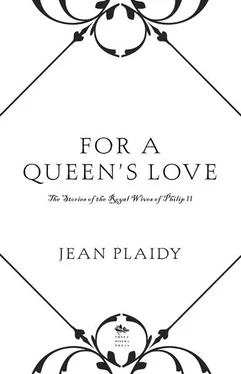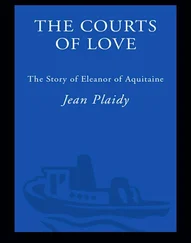Jean Plaidy - For a Queen's Love - The Stories of the Royal Wives of Philip II
Здесь есть возможность читать онлайн «Jean Plaidy - For a Queen's Love - The Stories of the Royal Wives of Philip II» весь текст электронной книги совершенно бесплатно (целиком полную версию без сокращений). В некоторых случаях можно слушать аудио, скачать через торрент в формате fb2 и присутствует краткое содержание. Жанр: Старинная литература, на русском языке. Описание произведения, (предисловие) а так же отзывы посетителей доступны на портале библиотеки ЛибКат.
- Название:For a Queen's Love: The Stories of the Royal Wives of Philip II
- Автор:
- Жанр:
- Год:неизвестен
- ISBN:нет данных
- Рейтинг книги:5 / 5. Голосов: 1
-
Избранное:Добавить в избранное
- Отзывы:
-
Ваша оценка:
- 100
- 1
- 2
- 3
- 4
- 5
For a Queen's Love: The Stories of the Royal Wives of Philip II: краткое содержание, описание и аннотация
Предлагаем к чтению аннотацию, описание, краткое содержание или предисловие (зависит от того, что написал сам автор книги «For a Queen's Love: The Stories of the Royal Wives of Philip II»). Если вы не нашли необходимую информацию о книге — напишите в комментариях, мы постараемся отыскать её.
For a Queen's Love: The Stories of the Royal Wives of Philip II — читать онлайн бесплатно полную книгу (весь текст) целиком
Ниже представлен текст книги, разбитый по страницам. Система сохранения места последней прочитанной страницы, позволяет с удобством читать онлайн бесплатно книгу «For a Queen's Love: The Stories of the Royal Wives of Philip II», без необходимости каждый раз заново искать на чём Вы остановились. Поставьте закладку, и сможете в любой момент перейти на страницу, на которой закончили чтение.
Интервал:
Закладка:
“Your Highness …” cried the cobbler.
Carlos lunged at the man with his fists, but the cobbler was strong and the Prince was puny. Carlos wanted to cry with anger because his blows had no effect on the stalwart young man. He was acutely aware of his own weakness, the deformities of his body, the hump on his back which his loose doublet could not quite conceal, his pallid face, his rolling eyes and his loose jaw, of those legs which were not the same length.
He wanted to cry: “Love Don Carlos. Love this little one and he will not hurt you.”
But there was disgust in the cobbler’s eyes, and Don Carlos recognized this. He knew that all the people who watched him despised him, and that if he had not been a prince they would have turned against him; they would have driven him out of the kitchens, out of the palace, sent him into that world where nobody loved him.
So he would revenge himself on all those who were powerless to act against him.
“Eat … Eat. You are commanded to eat.”
The bewildered man put a piece of leather into his mouth. He swallowed and choked. He began to cough and vomit while the Prince roared with glee.
“More! More! Don Carlos will call in the whippers if you do not. They will make you eat.”
And into his mouth the cobbler put another piece of leather. He choked, coughed, and was sick. His face was yellow now—yellower than that of Carlos. He looked ugly in his discomfort, uglier than Carlos. This was what the Prince liked; he was enjoying this. He must have more of such games.
There were still several pieces of leather on the platter, but it was clear that the cobbler would not be able to swallow them. He was writhing now in agony and Carlos was beside himself with mirth, commanding the onlookers to join with him in urging the cobbler to greater efforts.
There they stood, shocked into sullenness. Carlos would show them.
“Laugh! Laugh!” he screamed. “You there … You … cook! If you are sorry for this traitor, you may help him eat his tasty dish.” Carlos laughed until the tears spurted from his eyes and moisture dribbled from his lips, spattering the black velvet of his doublet. Thus he did not immediately see the messenger from his father’s suite who had entered the kitchen.
“Your Highness,” said the messenger. “On the instruction of his most royal Highness, Prince Philip, I ask you to go at once to your apartments.”
Carlos swung around, his face working with fury, the tears of laughter turning to tears of rage. He stammered: “You … you shall eat this. You … you … who dare to order Don Carlos.”
“I do not order your Highness. I but obey orders, the orders of his most royal Highness, Prince Philip.”
“They shall not be obeyed. Don Carlos is the Prince. Don Carlos shall not …”
The cobbler was lying unconscious on the floor; the cooks and kitchen workers stood very still, watching the conflict between the unbalanced Prince and the envoy from his father.
“Your Highness,” said the clear, calm voice, “I beg of you, accompany me. Your father’s guards await you. They will escort you to your apartments. So, I beg of you, let us go.”
Carlos knew that he was powerless. Someone had carried the tale of his sport to his father, and his father had sent men to put him under what was tantamount to arrest.
Even as Carlos hesitated, Philip’s physician came into the kitchens and went to attend to the unconscious man on the floor.
Carlos knew that he was beaten. He was a boy as yet and the whole of Spain was against him.
So, the men about him fell back, and while Philip’s own physician attended to the cobbler, Don Carlos was obliged to walk, most shamefully, out of the kitchens with his father’s messenger; and as he went along the corridors and up staircases to his own apartments, he could hear the steady footsteps of his father’s guards tramping behind him.
Of all the people in the world, Don Carlos hates him most, thought Carlos. One day Don Carlos will kill Don Philip.
So Philip knew that he must marry again; without delay he must have another heir. That young monster called Don Carlos must not be his only offering to Spain. He was about to send dispatches to Ruy Gomez in Portugal, telling him to complete the marriage negotiations as quickly as possible, when news came from the Emperor.
Charles was evidently excited.
“My son,” he wrote, “hold up the negotiations with Portugal. Something is happening in England which must command our close attention. We cannot afford to close our eyes to events in that island. Flanders is ours, but to keep it ours without the might of the Empire behind us will not be an easy matter. There are the French on one side, the Lutheran Princes on the other. The only way in which we can hold Flanders is to make England our ally. That is why we must earnestly consider what is happening there.
“For some years the young King Edward has been ailing. News has reached me that he is dying—some say of poison. By the time this reaches you Edward the Sixth of England will be no more. The Duke of Northumberland will try to put Lady Jane Grey on the throne. Our friends there inform me that this cannot succeed. The English will not have Lady Jane for their Queen; they are a determined people who will choose their own rulers. They are all behind our kinswoman, Mary Tudor, and I doubt not that in a short time the throne will be hers.
“You will readily see that if England and Spain were united in lasting union—and it must be lasting—we need no longer fear the French. With England beside her, the greatest power in the world today—in spite of all we have lost here in Europe—would be Spain.
“You see what I mean? Our kinswoman, Mary Tudor, is unmarried; and you, my beloved son, are unmarried. Philip and Mary could unite Spain and England. Not only would such a marriage restore the power of Spain; it could bring England back to Holy Church.
“Mary would make an excellent wife for you. She is only eleven years your senior; she is of the same stock, being a granddaughter of our own Queen Isabella the Catholic, your great-grandmother. She is a devout Catholic. My son, you are twenty-six years old; you are a man of sound judgment. I do not command you to this marriage, for I know full well that having considered it and seen it to be your duty to Spain, you will not hesitate.”
Philip stopped reading.
Mary Tudor! A woman of thirty-seven, a niece of mad Queen Juana, who was still living her frenzied existence in the Alcázar of Tordesillas.
No; certainly he would not have chosen Mary Tudor.
He would have to go to England—to that dark and dreary island which he had never seen, but of which he had heard much; he would have to spend a long time among a barbarian people whose tongue he could not speak; he would have to marry an aging woman whom he was sure he could never love.
He resumed the reading of his father’s dispatch. “I do not command … for I know full well that having considered it and seen it to be your duty to Spain, you will not hesitate …”
How well his father knew him!
He wanted to cry out against this suggested marriage; but there must be no question of his personal wishes.
He was the slave of his country.
TWO
In the city of Valladolid, flags of rich velvet and brocade fluttered from the windows. In the streets the people stood about to admire the decorations and see what they could of the bullfights, the sports, and the tourneys. This was a great day for Spain, it was said, for now Spaniards would see an end to continual wars. When they were allied with England none would dare attack them; and they would soon be allied with England through the strongest tie it was possible to make—that of the marriage of their own Philip with Mary Tudor.
Читать дальшеИнтервал:
Закладка:
Похожие книги на «For a Queen's Love: The Stories of the Royal Wives of Philip II»
Представляем Вашему вниманию похожие книги на «For a Queen's Love: The Stories of the Royal Wives of Philip II» списком для выбора. Мы отобрали схожую по названию и смыслу литературу в надежде предоставить читателям больше вариантов отыскать новые, интересные, ещё непрочитанные произведения.
Обсуждение, отзывы о книге «For a Queen's Love: The Stories of the Royal Wives of Philip II» и просто собственные мнения читателей. Оставьте ваши комментарии, напишите, что Вы думаете о произведении, его смысле или главных героях. Укажите что конкретно понравилось, а что нет, и почему Вы так считаете.












